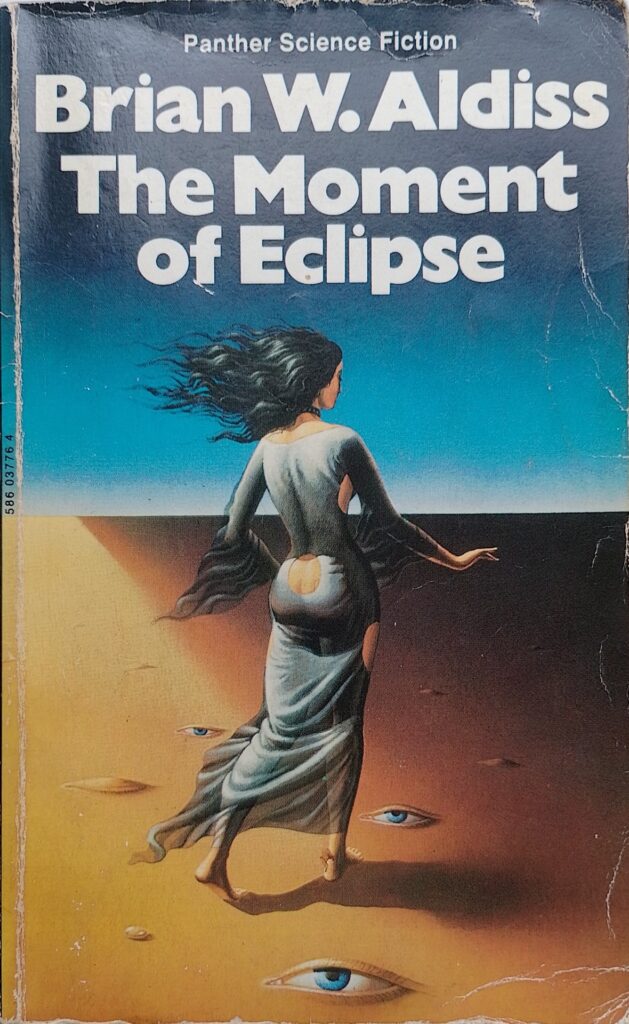First published 1970. Panther paperback, 1973, pp 187, c.65,000 words.
This is a collection of fourteen short stories which were first published in magazines between 1965 and 1970. It includes Super-Toys Last All Summer Long which was the inspiration for the Spielberg film AI Artificial Intelligence – originally a Stanley Kubrick film project. Presumably these were just a gathering together of the best stories Aldiss had written in the preceding five years, perhaps to meet a publishing contract or to cash in on his popularity.
There are no over-arching themes or commonality in time, place, character or style. The first three stories have a considerable erotic element (a favourite theme of Aldiss), but subsequent ones don’t. A couple of stories are set in India. Two have the same principle characters but are on different topics. A couple explore aspects of religious faith. The longest is thirty pages, the shortest five.
The opening story gives the title to the book. It starts with a poem by Thomas Hardy concerning an eclipse of the moon by the Earth and the thought that the moment displays how small the Earth is in the Universe, and therefore how petty human schemes are. The story itself is about a man’s pursuit of a woman, but along the way he becomes distracted by a film project he is working on. Its theme might be said to be distraction: ‘…all of life has unpleasant side effects. …consciousness itself is just a side effect, a trick of the light…’ [p25].
The second story is a very odd mash-up of something that reads like an Italian plague-period idyll interleaved with sections of weird imagination where the machines are like animals, with carnivores hunting down herbivores. The third is set in India where a UN organisation is trying to relieve a famine. An English man is helping in some extra-nummary role. His wife is far away and he is in pursuit of an Indian woman. Interleaved with his thoughts are odd lines of text, separated by black lines, that don’t fit in with the rest, or even each other much. This is presumably some technique intended to illustrate how our brains hop around between the main subject to disconnected thoughts. It is difficult to make sense of directly, but it adds a layer of reality, a feeling of being inside someone’s head.
Super-Toys is set in that favourite theme of sixties SF writers: future over population. Here the population has been controlled by not allowing children, except by winning a lottery. Instead, substitutes are found to satisfy the desire for family, which may be discarded in winning a lottery. It is a powerfully drawn idea.
Aldiss displays great imagination in creating alien life. In one story scientists are having trouble with an alien language that changes on stance of the speaker and is told in the form of a partial dictionary. Another features a far future were humans have evolved into diverse species – some are distinctly ape-like, but others have become intelligent tree-like creatures. Here, the protagonist comes to realise that what is missing from the meaning of his life is death – for the creatures are effectively immortal.
Aldiss writes fluently most of the time, and to great effect on occasion. His experiments with language sometimes work even when obscure: ‘Mankind driven always drive the bare foot on the way the eternal road of earth and no real destination only the way to water and longer grass. Will we be able to get a drink there always the stone beneath the passing instep.’ [p144]. When lucid his imagery is powerful: ‘they felt the heat of the plains upon them. It was the heat of a box, allowing no perspective but its own. The moisture in it stifled their lungs; with each breath, they felt their shoulders prickle and their bodies weep.’ [p146]
This is a fine set of short stories, but one needs a tolerance for experimental technique and a lack of any overarching structure to the collection. As a display of imagination and swift creation of atmosphere it works very well.
Wikipedia biography of Aldiss: https://en.wikipedia.org/wiki/Brian_Aldiss
Wikipedia summary of the book: https://en.wikipedia.org/wiki/The_Moment_of_Eclipse
Others’ reviews of the book: https://www.goodreads.com/book/show/2351900.The_Moment_of_Eclipse?ref=nav_sb_ss_1_20
© William John Graham, September 2023

